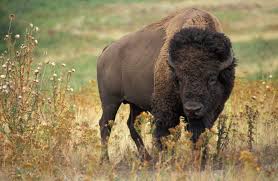
记忆方法
将“bison”想象成一头牛,它的大块头(big size)让它显得独特,就像“big”这个形容词。这样,通过牛的“big”形象来记忆“bison”这个单词。
以上内容由AI生成, 仅供参考和借鉴
中文词源
bison 野牛
来自PIE *weis, 流,散发臭味,词源同virus, 病毒。指野牛身上流出的腥味。字母r,s音变。
英语词源
- bison
-
bison: [14] Bison appears to be of Germanic origin, from a stem *wisand- or *wisund-. This became Old English wesand, which did not survive; and it was acquired again in the 19th century as wisent, borrowed from German wisent, applied to the ‘aurochs’, an extinct species of European wild ox. The b- form came into English via Latin bison, a borrowing from the Germanic. Originally of course referring to the European bison, the term was first applied to the North American species at the end of the 17th century.
- bison (n.)
- c. 1600, from French bison (15c.), from Latin bison "wild ox," borrowed from Proto-Germanic *wisand- "aurochs" (cognates: Old Norse visundr, Old High German wisunt "bison," Old English/Middle English wesend, which is not attested after c. 1400). Possibly ultimately of Baltic or Slavic origin, and meaning "the stinking animal," in reference to its scent while rutting (see weasel). A European wild ox formerly widespread on the continent, including the British Isles, now surviving on forest reserves in Lithuania. Applied 1690s to the North American species commonly mis-called a buffalo.
权威例句
- 1. a herd of bison
- 一群野牛
- 2. In the year 1700, about 60 million bison wandered freely in North America.
- 在1700年约有6000万头野牛在北美无拘无束地活动.
- 3. Large herds of bison used to live on the plains of North America.
- 大群的野牛过去曾生活在北美大草原上.
- 4. Reindeer receded northward and eastward, and bison and horse followed.
- 驯鹿向北方和东方撤退, 野牛和马也随之而去.
- 5. Herds of bison live in the park.
- 公园内住有成群的野牛。
